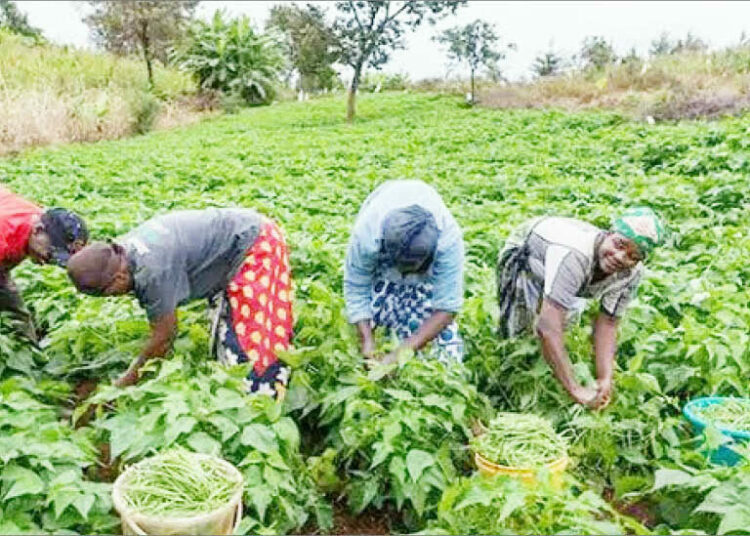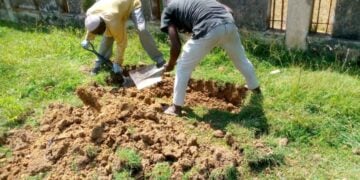Insecurity and drought are worsening food insecurity nationwide, prompting critical stakeholders to call for urgent intervention.
In Benue State, insecurity has remained a major challenge, contributing to food shortages and threatening food security as farmers continue to flee their ancestral homes, abandoning their farms for fear of attacks by marauding herdsmen and local bandits.
Benue farmers face different security challenges depending on their location. In Zone A, comprising seven local government areas, the worst affected are Katsina-Ala, Ukum, and Logo (collectively known as the Sankera axis), as well as Kwande.
Farmers in these local governments are contending with bandit and herder attacks which have forced about 90 per cent of the total population into Internally Displaced Persons (IDP) camps, while others are staying in the local government headquarters with friends and relatives.
In a telephone interview, the Mbaikyor youth leader in the Turan community of Kwande LGA, Gandepuun Igbawua, said the area is under frequent attack.
He said his community was attacked at the peak of harvest last year, forcing members to flee and abandon their harvest, including crops already stored in barns, for fear of being killed by the marauding herdsmen.
“We are known for producing Bambara nuts, rice, groundnuts, yams, and soybeans, among many other crops, but as I speak to you, our communities and neighbouring communities have been deserted. The herdsmen have now settled on the other side of the mountain, and any attempt to go to the farm results in death.
“Now, hunger is ravaging our people. After so much hard work, they have had to abandon their crops because of persistent attacks. What we are seeing now is looming hunger in the country because the herders are focusing their attacks on farming communities, drastically reducing our output,” he said.
In Zone B, also comprising seven Local Government Areas (LGAs), the worst hit are Guma, Gwer-West, Makurdi, and Buruku, where most members of affected communities have abandoned their homes and are living in camps or with relatives.
In Zone C, which comprises nine LGAs, the worst affected councils are Agatu, Apa, Otukpo, and Ado. However, displaced persons in the zone are not staying in camps; they are taking refuge with relatives in safer neighbouring communities.
Residents Flee as Herders, Bandits Take Over Community
Recently, palpable fear gripped residents of Dyom community in Ukum LGA as they fled in droves following the alleged settlement of armed herdsmen and bandits in surrounding farmlands.
A local, who identified himself as Nyianshima Iorfa, told one of our correspondents that armed herders and bandits have taken over farmlands and residential areas in the partly deserted Dyom community.
He said the herdsmen and bandits had established strongholds within and around the community, frequently setting up camps close to residential homes and retreating into nearby farms and forests whenever they sight security operatives or members of the recently launched security outfit, Operation Anyam Nyor.
Describing the situation as unbearable and dangerous, he said it has created tension and caused many people to flee, abandoning their homes and farms.
He alleged that herdsmen and bandits are now collaborating against farmers.
“The bandits are operating in the area in a similar way to the late warlord Terwase Agwaza, also known as Gana — imposing taxes on traders in local markets and assuming authority,” he said.
Many families, according to reports, have abandoned their farms, while others remain trapped in their homes under constant fear of violence.
Iorfa noted that the ongoing insecurity has crippled farming and market activities in the area, with food shortages and displacement on the rise.
When contacted, the Police Public Relations Officer, Udeme Edet, said she was yet to receive such reports.
The immediate past chairman of the All Farmers Association of Nigeria (AFAN), Aondongu Saaku, told our correspondent by phone that climate change had affected farmers, especially those who have refused to adapt from traditional methods of farming.
He said the delay in distributing farm inputs such as fertilisers, herbicides, pesticides, and tractors has greatly affected yields, but that the impact of climate change is even more severe, forcing many to revert to organic farming methods.
Local production issues such as insecurity in farming regions, climate change, and low productivity continue to contribute significantly to food inflation.
For instance, rice production has decreased in Benue due to insecurity, while maize production has declined by about 10 per cent in the past two years due to restrictive trade policies and growing demand.
Agriculture expert Professor Godwin Abu lamented that countless smallholder farmers who were constantly producing various crops have now been displaced from their ancestral homes by marauding herdsmen, a situation he described as a grave threat to food security in the state and across the country.
“The crisis has taken a dangerous dimension, and the federal government is not doing much, leaving the whole burden to state governments, who lack the resources to handle such overwhelming attacks on farmers.
“This crisis has engulfed 33 out of 36 states; that is why Nigeria has been branded the poverty capital of the world. The people who once produced food are now collecting handouts from the government, and this has drastically reduced market supply,” he lamented.
Prof Abu, who is a lecturer in the Department of Agricultural Economics at the Joseph Sarwuan Tarka University Makurdi (JOSTUM), noted that the inflation figure has even doubled above what the NBS had initially announced as prices go up everyday.
He added that the few people that are still able to go to the farm cannot even afford to buy farm inputs and those in rice production cannot even sell because of the federal government’s policy of exporting rice.
“I am a rice farmer; I also process rice. But what has happened forced me to shut down my farm and business. As things stand, demand for foodstuffs in the market has exceeded supply.”
Farmers Seek Subsidised Inputs in Niger State
Amid perennial floods and insecurity, smallholder farmers in Niger State have decried the lack of access to subsidised farm inputs and storage facilities needed to ensure food security.
Over the past three years, floods have washed away large areas of farmland, especially in the lower course of the River Niger around Mokwa, Lavun, Edati, Katcha, and parts of Agaie and Lapai LGAs.
Similarly, areas around Shiroro, Kainji, and Wushishi, which house the hydropower dams, are frequently prone to floods, severely affecting yields. Communities such as Mariga, Magama, Shiroro, Rijau, Rafi, and Munya are also plagued by incessant bandit attacks, forcing many smallholders to abandon their homes.
Usman Kwatu, chairman of the Niger State chapter of Small Farm Holders, said farmers may not sustain production levels due to the high cost of farm inputs such as fertilisers and insecticides.
“This year, we purchased fertilisers for as high as ₦80,000 per bag. How many hectares can one bag cover? How can we sustain this to improve food security?
“If the government is importing food to crash prices, it is not sustainable. The only way to enhance food security is through empowering smallholders like us with subsidised inputs.”
Kwatu urged the government to encourage mechanised farming and provide subsidised inputs to enable farmers to break even and expand holdings for sustainable production. He also called for stronger security measures to protect farmers and improve productivity.
A root crop farmer, Gambo Mohammed, said the main challenge for those cultivating root crops is access to storage and value chains to ensure all-year availability.
“We must find a way to store crops like yam and add value so that prices remain stable and not cheap only at harvest, then exorbitant later,” he said.
Drought Hits Yobe
Farmers in parts of Yobe State, particularly around Damaturu, are grappling with the devastating effects of drought that has destroyed crops due to a shortage of rainfall.
Many farmers and residents have expressed deep concern over the lack of rain, saying it has worsened living conditions.
Some farmers told LEADERSHIP Weekend that the shortage of rainfall, unlike in other parts of the state, has left crops such as maize, millet, and rice withered, potentially worsening food shortages.
Mallam Bukar Abba, a resident of Damaturu, said the rain ceased a month ago and now only drizzles, insufficient to sustain crops.
“This year’s short rainfall has left many farmers worried about crop yields and food security. If the drought continues, farmers could lose millions of naira since crops have not reached maturity,” he said.
Another farmer, Mohammed Salisu, from Gashua LGA, said the situation would be devastating if the shortage continues, as their livelihoods depend on farming.
“We have been facing short rainfall since the farming season began. We hope it rains soon because the situation is worrisome,” he stated.
Mallam Haruna Gini, a rice farmer from Yunusari, said, “I have five plots of land where I planted rice and other crops, but I lost everything because there was no rainfall. To make matters worse, the area is dangerous due to Boko Haram activities. Farming is already risky, and now drought has made it worse.”
He expressed fear that the combined effects of drought and insecurity could cause food prices to rise and trigger inflation next year.
Our correspondent who visited affected areas, including Gashua, Yunusari, Fika, Jakusko, Tarmuwa, Dapchi, Yusufari, Karasuwa, Nguru, and Damaturu, observed that many crops have already withered prematurely.
LEADERSHIP Weekend recalls that the Nigerian Meteorological Agency (NiMet) had earlier warned farmers, especially in northern regions, that the 2025 rainy season might start late and end early.
Kaduna Farmers Brave Security Challenges
In Kaduna State, residents have continued farming despite pockets of security challenges.
Although the state did not experience the severe flooding predicted by NiMet this year, some communities witnessed mild floods. Smallholder farmers told LEADERSHIP Weekend that security had improved, allowing them to return to their farms in some areas.
Gaiya Sambo, a maize farmer in Chikun community, said, “Some of us abandoned our farmlands six years ago because of insecurity, but now we can farm in certain communities. Many farmers were kidnapped during the height of insecurity. Many villages were deserted. My farmland is three kilometres from the Kaduna–Abuja Expressway.”
Another farmer, Vincent Auta, said, “Some communities in Chikun and other LGAs still experience isolated attacks. I farm cassava on a large scale. Security has improved across Kaduna, but not completely. I’ve not gone back to Birnin Gwari to farm cassava — I’m still afraid. Now I only have two farms in Chikun.”
Kaduna State Governor Uba Sani has declared that his administration’s kinetic and non-kinetic approach to tackling insecurity had significantly reduced banditry in Birnin Gwari and other parts of the state.
He added that about 500,000 hectares of farmland previously abandoned by farmers due to insecurity have now been recovered, as farmers return to the fields.





